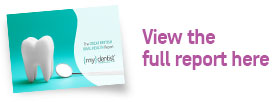Dental news
3 in 10 Brits can’t access an NHS dentist
- report sheds light on the extent of the dentistry crisis in the UK -
Despite the hard work of dental teams during the pandemic, nearly a third (30%) of people in the UK haven’t been able to access an NHS dentist in the past year, a new report reveals.
The Great British Oral Health Report – which combines a public attitudes survey with national data – found that 53% of people had not seen a dentist in the last year, with 56% of those who hadn’t reporting that this was because they weren’t able to get access.
Some 28% of those who had not been for a check-up within the last year could not get an appointment with their usual dentist, 14% said they were unable to register for a routine check-up with an NHS dentist, 16% were unable to afford care, 3% were unable to travel to a dentist, and 5% could not get an appointment because their usual practice had closed.
Nearly three fifths (58%) of people think it has become more difficult to visit an NHS dentist now compared to a decade ago, with four in ten stating it has been much more difficult.
The report suggests that, although demand for dentists is high and NHS dental teams have been working continuously during the pandemic to improve access to care for patients, there aren’t enough dentists in the UK to fill the current vacancies. When informed of the shortage of UK dentists, 78% of respondents support bringing in highly skilled dentists from outside the UK to help fill this gap and meet demand for NHS dentists.
The Great British Oral Health Report is produced by {my}dentist, the UK’s largest provider of NHS dentistry, in collaboration with YouGov. It combines a new national online survey of 2,026 people from across England, Scotland and Wales, with the latest published evidence in the dental sector.
The majority (84%) of respondents said urgent dentistry services (e.g. emergency tooth extraction) should be a high priority for the NHS.
Almost a fifth (19%) of the respondents reported they have had to perform “DIY dentistry”, such as temporary home fillings kits (3%), painkillers (13%) or teeth removals (1%), as the current system meant they could not see a dentist.
There is also significant variation in access to dentists between the devolved nations and within countries:
- The report revealed that 9% more people were able to access routine NHS dentistry in the South of England compared to the North over the past year. People in the North East were most likely to have not been to the dentist in over 10 years compared to other parts of England, and are twice as likely to have used a DIY temporary filling kit (6%) than the national average (3%)
- People in the South West who have been to the dentist for a routine check-up within the last year are most likely to live more than 5 miles away from a dentist (33%), and when they do go to the dentist, are most likely to receive treatment privately.
- In England and Scotland more than 40% of respondents said they had a routine check-up within the past year, whereas in Wales not even a third of respondents claimed the same (31%).
- Data from Public Health England, referenced in the report, also suggests that there is a deep deprivation divide in dental health, with the proportion of children with dental decay in the most deprived communities being 3.8 times higher than the least deprived areas.
Tom Riall, Chief Executive of {my}dentist, said:
“Despite the heroic hard work of dentists, millions of patients are struggling to access the care they need.“There is a growing workforce shortage, NHS dentists are facing increasing pressures, and many are considering leaving the profession altogether.
“We need action now to support NHS dentists and to fix the dental workforce crisis once and for all. Without this, the problem will only get worse - more patients will be left in unnecessary pain and discomfort, dental decay will go untreated, and vital oral cancer diagnoses will be missed.”
